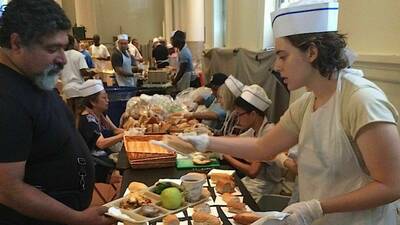Notre Dame Religious Liberty Clinic files amicus brief supporting church’s freedom to serve those in need

In October, Notre Dame Law School’s Religious Liberty Clinic filed an amicus brief in the U.S. District Court for the District of Oregon case St. Timothy's Episcopal Church et al. v. City of Brookings, advocating for religious organizations’ freedom to serve the hungry. The brief was filed in support of the church, which has long served those in need in Brookings, Oregon. The city has now discriminated against St. Timothy’s by applying its land-use regulations to burden the church’s religious exercise, including its provision of meal services and other ministries. St. Timothy’s has challenged this discrimination.
Consistent with its Christian faith, St. Timothy’s has served those in need for decades by operating healthcare clinics and providing basic necessities to members of its community, with the approval and even encouragement of the local government. Since 2009, St. Timothy’s has offered free meals at lunchtime to the hungry. After other churches stopped offering meals in response to the pandemic, St. Timothy’s increased its lunchtime meal service to six days per week in order to meet the growing needs of the Brookings community. Following gripes from neighbors about St. Timothy’s ministries, the City Council responded by deciding that St. Timothy’s was now in violation of the local zoning code. The City also amended its code to require local churches to apply for a permit to offer meal services for those in need. Because the permit allows churches to provide meals only twice per week, St. Timothy’s now faces a choice: comply with the ordinance by giving up its religious exercise of providing meals to those in need more than twice per week, or risk facing a discriminatory enforcement action by continuing its critical ministry.
St. Timothy's Episcopal Church v. City of Brookings
Click on the link above to read the case documents that Notre Dame Law School’s Religious Liberty Clinic filed in the U.S. District Court for the District of Oregon.
The Notre Dame Religious Liberty Clinic’s brief demonstrates that the Religious Land Use and Institutionalized Persons Act of 2000 (RLUIPA) plainly prohibits local governments from putting religious organizations to such a choice. As the Supreme Court has recognized, Congress enacted RLUIPA to provide sweeping protection for religious exercise against discrimination by government officials regulating land use. The Clinic’s brief explains that Congress acted in response to specific evidence of widespread discrimination against religious individuals and organizations, especially against religious minorities. In fact, when considering and enacting RLUIPA, Congress heard repeated testimony of discrimination in land-use regulation — often prompted by the complaints of other neighborhood residents — against religious ministries exactly like those offered by St. Timothy’s.
Meredith Holland Kessler, staff attorney for the Religious Liberty Clinic, said, “As a Christian community, St. Timothy’s Episcopal Church seeks to live out the call in the Gospel to seek and serve Christ in all people by loving one another. The law protects the church’s freedom to do so by ministering to those in need.”
By enacting RLUIPA, Congress made clear that acts of ministry, such as those carried out by St. Timothy’s, are protected religious exercise and that neighbors’ complaints about the presence in their communities of services caring for the hungry, homeless, and those otherwise in need do not justify prohibitions on these services. The Clinic’s brief explains that courts across the country have agreed, concluding that discriminatory application of land-use regulation to target religious organizations’ charitable ministries substantially burdens their religious exercise in violation of RLUIPA.
Bernadette Shaughnessy, a second-year student fellow in the Notre Dame Religious Liberty Clinic, contributed to the brief alongside Kessler.
“St. Timothy’s parishioners are fighting for a basic right: the freedom to exercise their religion by providing for the needy in their community. It was a privilege to work on this brief in support of their efforts,” said Shaughnessy, a third-year law student.
About the Notre Dame Law School Religious Liberty Clinic
The Notre Dame Law School Religious Liberty Clinic represents individuals and organizations from all faith traditions to promote not only the freedom for people to hold religious beliefs but also their fundamental right to express those beliefs and to live according to them. Students in the Clinic work under the guidance of Notre Dame Law School faculty and staff to provide advice, counsel, and advocacy on a broad array of matters related to religious freedom in the United States and abroad. The Religious Liberty Clinic has participated in proceedings at all levels of federal and state courts, in administrative agencies, and before foreign courts and other governmental bodies around the world.
Learn more about the Religious Liberty Clinic at religiousliberty.nd.edu/clinic/.
Originally published by at religiousliberty.nd.edu on October 13, 2023.